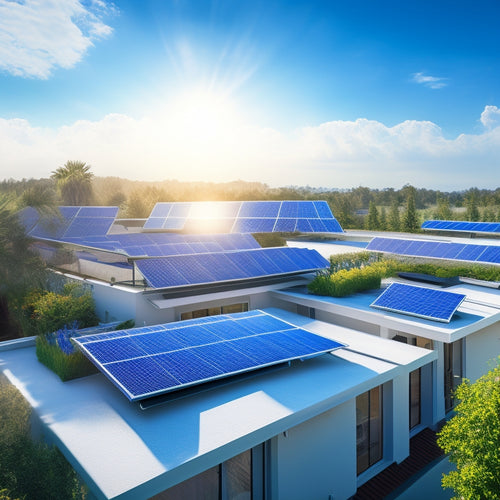
7 Essential Training Tips for Renewable Energy Contractors
Share
As a renewable energy contractor, you know that staying ahead of the competition requires continuous training and education. To guarantee you're up-to-date on the latest industry trends, technologies, and regulations, it is crucial to commit to ongoing learning, attend industry conferences, and subscribe to industry publications. You should also understand certification requirements, update your certifications regularly, and prioritize safety protocols. Develop a solid project management strategy, establish a strong online presence, and stay current with industry certifications. By following these critical training tips, you'll be well on your way to success - and there's even more to discover.
Key Takeaways
• Commit to ongoing learning through industry conferences, seminars, and workshops to stay updated on the latest renewable energy technologies and techniques.
• Understand certification requirements and regularly update certifications to demonstrate expertise and compliance with regulatory requirements.
• Familiarize yourself with local building codes, permitting processes, and safety protocols to ensure compliance and avoid project delays.
• Develop a detailed project plan, conduct risk assessments, and foster positive team dynamics to ensure successful project execution.
• Stay informed about industry publications, blogs, and newsletters to stay ahead of the curve in the rapidly evolving renewable energy sector.
Mastering Solar Panel Installation
When installing solar panels, you must confirm that the roof's structural integrity can support the added weight of the panels and mounting equipment. This critical step guarantees a safe and efficient installation process.
Next, it's important to assess the roof's orientation, pitch, and shading to optimize panel placement. Proper installation techniques, such as securing panels at the correct angle and using the right fastening systems, are essential to maximize energy production and prevent damage.
Regular panel maintenance is also important to ensure peak performance. You should inspect panels regularly for debris, dirt, and damage, and perform routine cleaning to maintain their efficiency.
Staying Up-To-Date With Industry Trends
To maintain competitiveness in the renewable energy sector, you must commit to ongoing learning, as industry trends and technological advancements emerge at an incredible pace. Staying up-to-date with the latest developments is essential to delivering high-quality services and staying ahead of the competition.
To achieve this, attend industry conferences, seminars, and workshops to gain valuable insights into emerging technologies and industry trends. These events provide a platform to network with peers, learn from industry experts, and stay informed about the latest innovations.
Additionally, subscribe to industry publications, blogs, and newsletters to stay current with the latest news, research, and breakthroughs.
Understanding Local Building Codes
As you stay current with industry trends, you'll also need to familiarize yourself with local building codes, which can vary greatly from region to region, impacting the feasibility and implementation of renewable energy projects. Understanding local building codes is essential for code compliance and successful project execution.
| Code Requirement | Description | Impact on Renewable Energy Projects |
| Permitting processes | Varying permit requirements and timelines | Delays or accelerates project timelines |
| Building envelope standards | Thermal insulation, window, and door requirements | Affects system design and energy efficiency |
| Electrical infrastructure | Grid connectivity and electrical panel requirements | Impacts system design, installation, and maintenance |
| Fire safety regulations | Fire-resistant materials and emergency access requirements | Ensures safe installation and operation |
| Zoning ordinances | Land-use regulations and setbacks | Influences project siting and feasibility |
Safety Protocols for Renewable Energy
You'll need to prioritize safety protocols for renewable energy projects, considering that even a single mistake can have devastating consequences. Renewable energy contracting is a high-risk profession, and it's important to take proactive measures to guarantee your safety and the safety of those around you.
When it comes to safety protocols, it's vital to conduct thorough Risk Assessments to identify potential Hazard Identification. This involves evaluating the work environment, equipment, and tasks to pinpoint potential hazards and take corrective action.
Here are some important safety protocols to implement:
-
Conduct regular site inspections to identify potential hazards and take corrective action.
-
Develop a detailed emergency response plan that outlines procedures for emergency situations, such as fires, electrical shocks, or falls.
-
Provide regular safety training to ensure that all team members are aware of potential hazards and know how to respond in emergency situations.
Effective Project Management Strategies
Now that you've established a strong foundation in safety protocols, it's time to turn your attention to the logistical aspects of renewable energy projects, starting with effective project management strategies that guarantee timely and within-budget delivery.
As a renewable energy contractor, you know that managing projects efficiently is important to your success. To achieve this, you need to develop a detailed project plan that outlines clear objectives, timelines, and resource allocation.
Conducting a thorough risk assessment is necessary to identify potential roadblocks and develop contingency plans. This proactive approach will help you mitigate risks and make sure that your project stays on track.
Additionally, fostering positive team dynamics is essential to your project's success. Encourage open communication, set clear roles and responsibilities, and empower your team members to take ownership of their tasks. By doing so, you'll create a collaborative environment that promotes productivity and efficiency.
Building a Strong Online Presence
As a renewable energy contractor, you know that having a strong online presence is essential in today's digital age. To get started, you'll want to establish a solid online identity that accurately represents your brand and services.
Establish Online Identity
Establishing a strong online identity is vital in today's digital landscape. A mere 30% of consumers say they trust a business without a website. As a renewable energy contractor, you need to establish a professional online presence that reflects your brand voice and showcases your expertise. This is pivotal in building trust with potential clients and setting yourself apart from competitors.
To establish a strong online identity, you should:
-
Define your brand voice: Develop a consistent tone and language that resonates with your target audience and reflects your values and mission.
-
Showcase social proof: Highlight customer testimonials, reviews, and ratings to demonstrate your credibility and expertise in the renewable energy industry.
-
Claim and optimize your online listings: Guarantee your business is accurately listed in online directories, and optimize your profiles with consistent branding and up-to-date information.
Develop Professional Website
You'll need a website that effectively communicates your unique value proposition and showcases your expertise in the renewable energy industry. A professional website is essential in today's digital age, as it serves as a hub for your online presence and a platform to demonstrate your authority in the field.
To get started, you'll need to register a domain that reflects your brand identity. This won't only give you a professional image but also make it easier for clients to find you online.
Next, focus on content creation that highlights your skills and experience in the renewable energy sector. This can include case studies, testimonials, and blog posts that provide valuable insights and tips. Make certain your content is engaging, informative, and optimized for search engines to improve your website's visibility.
A well-crafted website will help you stand out from the competition, establish trust with potential clients, and ultimately drive business growth. By investing time and effort into developing a professional website, you'll be well on your way to building a strong online presence that attracts and retains clients.
Staying Current With Industry Certifications
As a renewable energy contractor, you know that staying certified is important to staying competitive.
But with certifications expiring and new technologies emerging, it's vital to stay on top of the latest requirements and updates.
Certification Requirements
Staying current with industry certifications is vital to maintaining your competitive edge in the renewable energy sector, and obtaining the right credentials can greatly enhance your career prospects. As a renewable energy contractor, you know that certification requirements are essential to staying ahead in the industry. Not only do certifications demonstrate your expertise, but they also guarantee compliance with regulatory requirements and increase your chances of securing government incentives.
Here are some key certification requirements to focus on:
-
North American Board of Certified Energy Practitioners (NABCEP) certification: This is a highly respected certification in the solar industry, demonstrating your expertise in solar panel installation and maintenance.
-
OSHA certification: This certification ensures you're up-to-date on the latest safety protocols and regulations, reducing the risk of accidents on site.
-
UL certification: This certification verifies that your work meets the highest standards of safety and quality, giving your clients peace of mind and increasing your credibility.
Staying Up-to-Date
In order to maintain a competitive edge in the renewable energy sector, regularly updating your certifications is essential, as industry standards and technologies continually evolve.
You must stay current with the latest developments to remain a valuable asset to your clients and stay ahead of the competition.
To do this, you should prioritize ongoing education and training, attending industry conferences, and participating in workshops to stay informed about the latest Industry Insights and Technology Advancements.
Frequently Asked Questions
What Insurance Coverage Is Necessary for Renewable Energy Contractors?
As you navigate the renewable energy industry, you'll need insurance coverage that fills policy gaps, ensuring you're protected from unforeseen risks. Conduct a thorough risk assessment to identify vulnerabilities and tailor your coverage accordingly.
Can I Subcontract Work to Non-Certified Professionals?
'When you subcontract work to non-certified professionals, you'll assume liability concerns and legal ramifications, putting your reputation and business at risk; it's important you vet and verify their qualifications to avoid potential lawsuits and damages.'
How Often Should I Inspect My Equipment and Tools?
Did you know that 70% of equipment failures are preventable? You should inspect your equipment and tools regularly, ideally every 3-6 months, to guarantee preventive maintenance and equipment calibration, avoiding costly downtime and ensuring your work meets high standards.
Are There Any Tax Incentives for Renewable Energy Businesses?
As a renewable energy business owner, you're eligible for green subsidies and energy credits, which can greatly reduce your tax liability, so be sure to claim them to maximize your profits and stay competitive.
Do I Need a License to Sell Renewable Energy Systems?
"You're about to harness the power of renewable energy, but first, do you need a license to sell systems? Yes, you'll need renewable credentials, such as energy certifications, to prove your expertise and build trust with clients."
Related Posts
-

5 Essential Tips for Buying EV Charging Systems Online
When purchasing an EV charging system online, you'll want to make sure you're making an informed decision. First, det...
-

Why Cities Need Smart Charging Infrastructure Now
You're about to experience a tidal wave of electric vehicles hitting your city's streets, and it's essential you're p...
-

Best Solar Panel Options for Maximum Energy Savings
You can maximize your energy savings with solar panels that boast efficiency ratings above 20%, paired with extensive...


